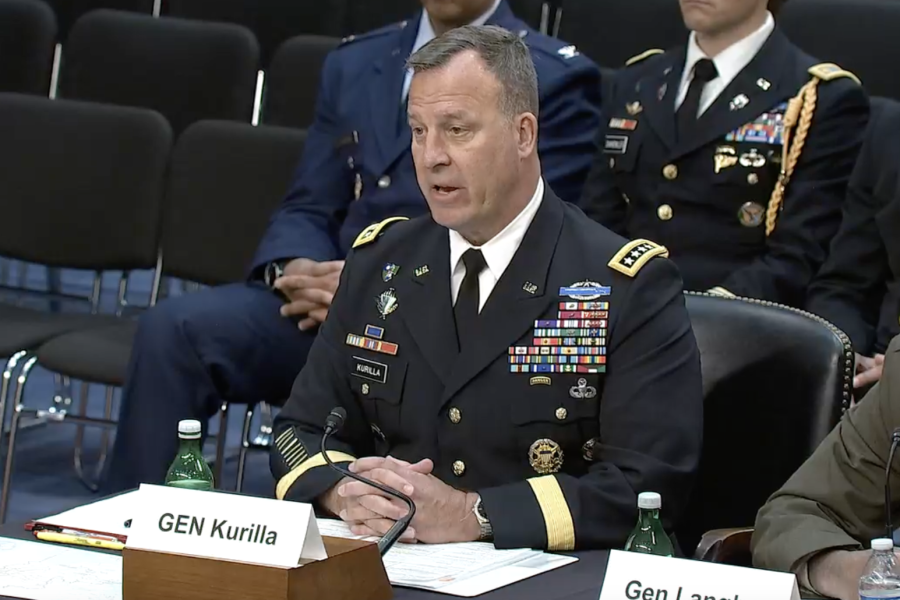Army Gen. Michael E. Kurilla, head of U.S. Central Command, urged lawmakers to approve more than half a billion dollars in funding to combat unmanned aerial systems in the Middle East after months of attacks by Iran-backed militia groups.
The $95 billion national security supplemental package that passed the Senate in February contained $531 million for counter-UAS efforts in CENTCOM, and Kurilla told the Senate Armed Service Committee on March 7 that those funds will allow him to procure “technology I need to get forward into the theater that will save lives.”
Much of the focus surrounding the supplemental has been on the aid designated for Ukraine, Israel, and Taiwan. But Kurilla told committee chair Sen. Jack Reed (D-R.I.) that the package is “absolutely critical” for his command as well—it designates $2.4 billion specifically for CENTCOM “and to replace combat expenditures for weapons in the Red Sea,” according to a Senate Appropriations Committee summary.
The Houthi rebel group, backed by Iran, has been conducting a monthslong campaign against commercial shipping and naval vessels in the region using drones, cruise missiles, and anti-ship ballistic missiles. On March 6, CENTCOM reported that three sailors on a merchant vessel died in a Houthi missile strike in the Gulf of Aden.
Other Iran-backed militia groups launched more than 150 attacks on U.S. troops in Iraq, Syria, and Jordan, from October through January, culminating in the deaths of three U.S. soldiers and injuries to more than 40 other service members in a drone attack near the Syrian border on Jan. 28, marking the first time American troops were killed by enemy fire since the conflict between Israel and Hamas in Gaza began in October.
The $531 million for CENTCOM “is for counter-unmanned aerial system defense, the various systems that are shooting down a lot of these systems, it’s for our command and control systems,” Kurilla said. “It’s for a lot of the modernization efforts that we need.”
Kurilla also said an integrated air and missile defense system to counter the increased attacks on U.S. service members is “one of the top things” the CENTCOM is working on.
“Through our regional partners, one of the first things that we’re trying to do is come up with a common air picture,” Kurilla said. “You have to be able to see the threat before you can defeat it, where there’s many elements that we are doing in terms of radar sharing agreements with a lot of our regional partners.”
Troops in CENTCOM are also experimenting with affordable new technology to improve operational security, Kurilla said.
“There is the technology, there are things out there, we have to continue to experiment,” Kurilla said. “We’re experimenting right now with a system that actually can go after both UAVs and land attack cruise missiles because it can go 300 knots, but if you go out there and you decide not to engage, you can bring it back and have it land. What we have to get better at, is the cost curve on that, to get those systems to be less expensive, less expensive.”
The CENTCOM boss cautioned against the proliferation of small, nimble, and inexpensive Iranian drones.
“That is one of the top threats because it is it is inexpensive, it’s a precision-guided weapon,” Kurilla noted. “Iran produces some that can go over 2,000 kilometers with those weapon systems. The bigger concern is if you start talking about swarm. So we need to continue to invest in things like high-powered microwave to be able to counter a drone swarm that is coming at you.”
Kurilla acknowledged the effectiveness of systems like the Coyote air defense weapon, but stressed that “nothing is 100 percent” and argued the need for a layered defense strategy.
The ongoing attacks by the Houthi group on shipping routes through the Bab el-Mandeb Strait demonstrate the difficulty in effectively countering them. Despite strikes and counterstrikes from the U.S. military, the Iranian-backed group has shot down two USAF MQ-9 Reapers, each costing $30 million, within three months since November.
CENTCOM needs broader government support in denying Tehran the ability to resupply the Houthis, Kurilla said.
“Anti-ship ballistic missiles, anti-ship cruise missiles, and the myriad of other systems that they are using all provided by Iran, but to degrade that capability means nothing if Iran is able to resupply them,” Kurilla said. “So we have an effort to deny Iran the ability to resupply them, and that’s where we need more of an international, and a whole-of-government approach to be able to stop Iran from resupplying the Houthis.”
